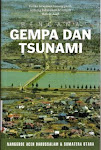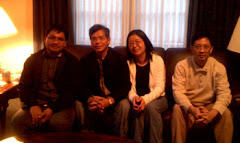Selamat ulang tahun PD Kharismatik ke -6. Saat mendapat tawaran sebagai pembawa firman, saya awalnya mengajukan keberatan. Saya ingin hadir dalam perayaan istimewa ini sebagai pendengar firman. Saya ingin mendengarkan refleksi 6 tahun komunitas kharismatik. Bukankah keindahan kehidupan terletak setengahnya dalam refleksinya? Saya akhirnya luluh dengan permintaan kepada panitia untuk memberikan usulan tema.
“Perbedaan: Kerendahan Hati & Kesombongan;
Kehendak Tuhan & Kehendak
Hati Sendiri;
dan Pelayanan untuk Tuhan & Pelayanan Ambisi Pribadi.
Buah Pelayanan
“Orang yang baik mengeluarkan barang yang baik dari perbendaharaan hatinya yang
baik” (Lukas 6, 45).
“Nggak ada recehan lagi.”
Sahabat lain juga mengeluarkan recehan, bahkan jumlahnya bertambah untuk merek a meminta belakangan.
“Mengapa kamu murah hati sekali kepada mereka?”
Ia sekedar mengangkat bahunya karena sulit menerangkannya.
Penjual nasi goreng mendekati tikar kami dan menyuguhkan sepiring nasi goreng yang menggunung tingginya.
“Kami pesan paket nasi goreng porsi biasa, bukan porsi mahasiswa.”
“Saya mengubahnya jadi porsi jumbo karena kalian bermurah hati pada pengemis dan pengamen jalanan.”
“Ibu nggak rugi?”
“Pemberian kepada orang lain jangan pernah membuat kita jatuh miskin setelahnya. Pemberian yang benar justru memperkaya kita setelahnya.”
“Dengan prinsip ini, warung lesehan bertambah pelanggan setiap hari.”
Perutusan dalam Nama Allah
Henry J.M. Nouwen menulis,“Ministry is service in the name of the Lord.” Bahasa Indonesia mengalami kesulitan untuk menerjemahkan kalimat pendek ini. Nouwen memberi keterangan tambahan dengan kutipan teks kitab suci,
Roh Tuhan ada pada-Ku,
Oleh sebab Ia telah mengurapi Aku,
Untuk
menyampaikan kabar baik kepada orang-orang miskin;
Dan Ia telah mengutus Aku
Untuk memberitakan pembebasan
Kepada orang-orang tawanan,
Dan
penglihatan bagi orang-orang buta,
Untuk membebaskan orang-orang yang
tertindas,
Untuk memberitakan tahun rahmat Tuhan telah datang (Lukas 4, 18 –
19).
Saya kemudian memahami pelayanan sebagai “perutusan dalam nama Tuhan dihadapan komunitas.”
Pelayanan kristiani lebih berkaitan dengan ‘spiritualitas’ daripada dengan ‘teknik’ kepemimpinan. Seseorang dikatakan memiliki spiritualitas jika ia “berdiri dihadapan Allah dengan hati dan budi terbuka.” Keterpautan spiritual dengan Allah akan membuatnya memiliki keterpautan sosial dengan yang dilayaninya.
“Semakin kita akrab dengan Allah, semakin kita dekat pula dengan manusia. Allah bersemayaml dalam kenisah batin kita (inner sanctuary) dan berkemah pula dalam kenisah batin saudara-saudari kita.”
Nouwen berbicara mengenai kemegahan spiritual (spiritual greatness). Pelayan kristiani dapat memiliki kemegahan spiritual tanpa harus menghadirkan pribadi-pribadi lain sebagai pembandingnya.
Saya dapat menilai, “Jenny itu cantik” tanpa harus menambahkan “lebih cantik atau kurang cantik dari perempuan lain.”
Membawa Yang Terpinggir ke Tengah
Apakah ketrampilan kepemimpinan dengan demikian kurang penting?
Orang tua sahabat saya senantiasa mendorong anak-anaknya untuk makan bersama. Karena sibuk dengan pekerjaan rumah lain, ibunya kadang-kadang lupa mengecilkan api kompor. Akibatnya nasinya berkerak. Ia meletakkan kerak untuk menutupi nasi agar tetap hangat.
Hampir semua anaknya menyingkirkan kerak nasi ke samping saat mengambil nasi. Seorang anaknya selalu mengambil kerak nasi ke piringnya.
Suatu malam suami isteri itu bicara mengenai anak yang mengambil kerak nasi.
“Ia akan menjadi pemimpin yang baik di kemudian hari.”
“Mengapa bisa demikian?”
“Ia menyantap kerak nasi yang disingkirkan saudara-saudarinya.”
Bagian tubuh paling istimewa dari gereja bukan kepala yang memimpin atau tangan yang mengontrol, tetapi bagian tubuh yang paling jauh dari kata istimewa. Seorang pemimpin kristiani menempatkan yang mereka yang paling di pinggiran untuk berada di pusat hidup Gereja. St. Paulus menuliskan demikian,
“Dan kepada anggota-anggota tubuh yang menurut pemandangan kita kurang
terhormat, kita berikan penghormatan khusus” (1 Kor 12, 23).
Jebakan dalam Pelayanan
Saya teringat salah satu filosofi Jawa: Becik ketitik, ala ketara. Yang baik akan tersingkap, yang jelek akan terungkap.
Pemimpin kristiani masa depan tidak memberikan kelebihannya, tetapi kerapuhan dirinya (vulnerable self). Kerapuhan diri di dunia kita seringkali harus disembunyikan. Cobalah sekarang berdiri di depan cermin. Seberapa tebal make up pada wajah kita agar menutupi bagian-bagian yang dalam pandangan kita kurang elok?
Kekuasaan menjadi pengganti paling mudah untuk tugas sulit mengasihi. Kita lebih mudah menjadi Allah daripada mengasihi Allah, untuk mengontrol orang lain daripada mengasihi orang lain, untuk mencintai kehidupan sendiri daripada mencintai kehidupan. Kehadirannya tidak “mengancam dan menuntut, tetapi justru mengundang dan membebaskan.”
Saya seringkali mendengar ucapan terhadap sahabat kita yang beberapa waktu tidak aktif dalam komunitas kita, “Tumben kamu datang?” Mengapa kita sulit berkata kepadanya, “Sudah lama kita tak bertemu ya?”
Pemimpin kristiani memiliki kepercayaan akan nilai kehidupan dan mengekspresikan dalam pelayanannya. Ia seperti seorang nelayan yang matanya berkilauan saat menemukan kerang karena memiliki pengharapan untuk menemukan mutiara di balik kerak kerang.
Siapa diantara kandidat presiden AS yang masih bicara dengan nada pengharapan di tengah krisis ekonomi belakangan ini?
Menjadi relevan (‘mengubah batu menjadi roti’), spektakuler (‘jatuhkan dirimu ke bawah’ dan berkuasa (‘memberikan semua kerajaan’) merupakan jebakan-jebakan dalam pelayanan.
Mendaku Panggilan dalam Komunitas
Nouwen mengakui kesulitan untuk membedakan antara yang menjadi panggilan dan yang sekedar menjadi keinginan kita. Rasa tidak aman, keraguan diri, dan kebutuhan untuk diakui orang lain seringkali menjadi membuat kita ragu, bahkan kehilangan kepercayaan pada panggilan Allah. Pelayanan yang tumbuh dari panggilan akan memberikan kedamaian dan suka cita sejati. Aktivitas yang hanya memberi tumpukan kerja, rasa capai, bahkan hilangnya semangat tidak memuliakan Allah.
Allah menghendaki kita untuk hadir dalam komunitas secara unik. Ia mengundang kita untuk mengenali panggilan batin dan kemudian mendakunya.
Perkenankan saya mengakhiri pembicaraan dengan mengutip catatan harian Nouwen mengenai pelayanan.
Hasrat saya semakin bertumbuh untuk berjalan keliling, menyapa pribadi lain,
mengunjungi mereka, bercengkerama di ruang tamu, bermain bola, dan melempar air.
Semoga mereka semakin mengenali saya sebagai saudara mereka. Bukankah perutusan
seorang pelayan pertama-tama dan terutama adalah hadir diantara yang
dilayaninya? Hasrat untuk menjadi relevan, spektakuler, berkuasa sedemikian kuat
menyetir saya sehingga waktu habis untuk pertemuan, konferensi, studi kelompok,
lokakarya, dan rapat kerja. Bukankah hal pertama yang dilakukan pemimpin itu
mengenal anggotanya, makan dan minum bersama mereka, berbagi kisah, berjabat
tangan serta berpelukan kasih?
Berkeley, 11 Oktober 2008
Mutiara Andalas, S.J.





































